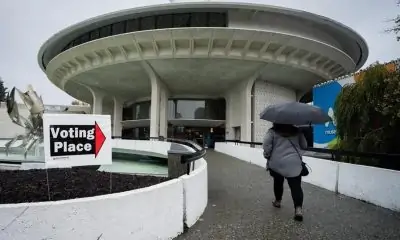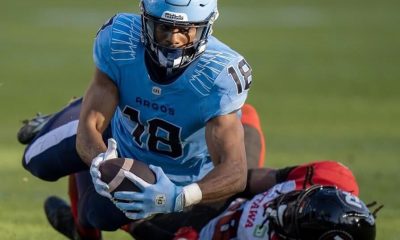Premier John Horgan unveiled Thursday the largest reforms to auto insurance since the creation of the Insurance Corp. of B.C. more than four decades ago, as his government struggles to stop continuing financial losses at ICBC.
Business
B.C. to cut ICBC rates 20 per cent and switch to 'no-fault' insurance – Vancouver Sun

VICTORIA – B.C. motorists are about to see a dramatic change to their auto insurance, as well as a 20 per cent cut to their premiums next year, under a new no-fault system announced by the B.C. government.
Premier John Horgan unveiled Thursday the largest reforms to auto insurance since the creation of the Insurance Corp. of B.C. more than four decades ago, as his government struggles to stop continuing financial losses at ICBC.
No-fault insurance will mean people involved in vehicle crashes can no longer sue each other for damages — except in cases involving court convictions for offences like negligence, street racing, impaired driving, as well as in cases of faulty manufacturing, botched repairs and the over-service of alcohol by a business.
Instead, people will receive benefits, payments for medical treatment and compensation directly from ICBC, using amounts set by the province depending on the type of injury.
“It’s time for change at ICBC,” said Horgan.
“A 20 per cent decrease in rates in the years ahead is a symbol to the people of British Columbia that we are going to wrestle this problem to the ground.”
The switch will upend B.C.’s litigation-based insurance model, in the process saving ICBC an estimated $1.5 billion annually in legal fees that the NDP government pledged will be redirected to cut rates, boost treatment benefits and quicken response times for claims.
“You shouldn’t need a lawyer to access the benefits you’ve paid for,” said Attorney General David Eby.
“The current auto insurance system in British Columbia simply doesn’t work.”
The government will introduce enabling legislation in the spring session of the legislature, which starts next week. But the no-fault system won’t come in until May 1, 2021 – just five months before the scheduled provincial election.
In the meantime, ICBC’s basic rates will not increase in 2020, the government revealed Thursday.
In 2021, when no-fault takes effect, basic and optional rates will be reduced an average of 20 per cent, saving motorists on average $400 a year, said Eby.
Had the government not made the change, rates would have risen 36 per cent over the next five years, adding an average of $650 million to an annual insurance package, according to government estimates.
A B.C. government chart outlining the estimated savings for motorists under the new no-fault insurance system.
The cuts to premiums come after ICBC redesigned its rate risk structure in 2018, leading to savings for some motorists but steep hikes for inexperienced drivers and youth. Government figures appear to show the rate cut in 2021 would save a Burnaby driver with one year’s experience as much as $1,570 annually on basic and optional insurance.
Eby admitted it sounds “too good to be true” that B.C. will move to a model that boosts benefits and cuts premiums. But he pointed to other provinces like Manitoba and Saskatchewan as already operating such systems.
“It’s only because we see it actually being delivered in two other province that we believe we can do it,” he said.
The new no-fault system will boost the maximum lifetime care benefits an injured person could receive from $300,000 to $7.5 million, with the additional promise that more funding will be available for visits to physiotherapists, chiropractors, counsellors and other recovery services.
For example, the amount ICBC will pay in lost wages is set to increase to $1,200 a week under no-fault, compared to $740 a week set in 2019 and only $300 a week before that. People who earn more than that amount can choose to purchase additional optional insurance for extra wage benefits.
A person’s doctor, not ICBC, will decide what recovery treatments are needed and for how long, according to the province.
In another scenario, involving an injured child, ICBC said no-fault would provide new up-front permanent care aides worth $10,000 a month, homemaking costs, missed school compensation of up to $20,000 a year and recreational benefits that would under the current system require a lawsuit and court awarded judgement.
The government says the benefits will be available for as long as a person needs, meaning funding for care aides and supports for more seriously injured victims could be sustained for a person’s entire lifetime and not, under the current system, simply involve a one-time lump sum payment in court that must be rationed by the victim for future years and can’t be re-litigated.
Money for pain and suffering will be eliminated for minor injuries, but for major injuries cash compensation will bet set by categories of benefits with maximum amounts set by ICBC, according to government. Repairs to vehicles will still be handled by auto adjustors with traditional damage assessments.
The model virtually eliminates the role of personal injury lawyers, who typically take one-third of the total amount awarded in a settlement and represent a powerful lobby group that continues to fight government reforms. They have argued a no-fault system would leave the most vulnerable victims, with the most catastrophic injuries, alone to face ICBC without legal help.
The Trial Lawyers Association responded on social media by saying that the change puts the rights of injured and vulnerable British Columbians “at grave risk.”
Eliminating costly legal fees is key to driving down the premiums, said Eby, though he acknowledged the change will be aggressively challenged by trial lawyers.
The only time an injured person will still be able to sue for compensation under the new no-fault model will be if the at-fault driver is convicted of intoxication, dangerous driving or other criminal negligence.
Disputes on settlements will be handled by the civil resolution tribunal, a retooled ICBC fairness commissioner and the provincial ombudsperson, though drivers can also go to court for a judicial review of decisions.
Although the system is called no-fault insurance, government officials who briefed the media Thursday said ICBC will continue to determine fault in crashes for the purpose of penalizing the at-fault driver with higher insurance premiums based on their crash history. However, everyone involved in a crash, regardless of fault, will have access to the same medical benefits – which for an at-fault driver means new care for things like permanent impairment.
Drivers will still be able to choose their deductible levels under no-fault, and purchase additional optional insurance from either ICBC or private providers — though optional insurance will mainly cover the areas of collision, comprehensive and travel outside of B.C.
Despite having a monopoly on basic rates, ICBC lost $2.5 billion over the past two years and is struggling to return to break-even status this year. It has blamed rising claims costs, as well as legal fees that amount to $700 million annually or one-quarter of all its expenditures.
B.C. had for years been the last province in the country to allow a purely litigation-based insurance model, called the tort system. It took a step toward reform last year with a $5,500 cap on pain and suffering costs in minor injury cases that is currently being challenged in court by the Trial Lawyers Association.
B.C.’s new no-fault system appears to align most closely with the structure of Manitoba, but with a more lucrative benefit maximum that compares to Saskatchewan’s levels.
In Manitoba, the Crown automobile insurer with control of compulsory basic insurance has had no-fault in place since 1993. Manitoba’s auto insurance premiums have risen 24 per cent since 2001, compared to more than 60 per cent in B.C. during the same time. Manitoba is dropping rates by almost one per cent in 2020.
In Saskatchewan, rates have not increased during the past five years and the province recorded the lowest number of road fatalities in its history in 2019.
However, B.C. did not copy Saskatchewan’s hybrid model for no-fault, in which motorists can opt-out and pay to the retain the right to sue. It also chose not to follow Ontario’s partial no-fault system, in which legal action is still allowed if your injuries are severe — a loss of a limb, spinal cord damage, blindness, and traumatic brain injury, among others. Ontario also has a fully private marketplace, with no government role in selling insurance.
Although the announcement of a new no-fault system took up much of Thursday’s announcement, Eby also revealed the province has retooled its efforts to cut down the number of expert reports used in court cases before the no-fault system comes into effect in 2021. Its first attempt to set caps on reports last year was overturned by the BC Supreme Court as an inappropriate infringement on judicial independence.
The government will amend the Evidence Act to set a limit of three medical expert reports per case, though leave it up to judicial discretion whether to allow more. The amount ICBC will pay per report will also be capped at $3,000 and no more than five per cent of the total settlement disbursement.
Some of those expert report case limits will apply to the 90,000 claims still on books at ICBC from before 2018’s minor injury cap, which accounts for as much as $10 billion in unsettled liabilities.
Business
Netflix’s subscriber growth slows as gains from password-sharing crackdown subside

Netflix on Thursday reported that its subscriber growth slowed dramatically during the summer, a sign the huge gains from the video-streaming service’s crackdown on freeloading viewers is tapering off.
The 5.1 million subscribers that Netflix added during the July-September period represented a 42% decline from the total gained during the same time last year. Even so, the company’s revenue and profit rose at a faster pace than analysts had projected, according to FactSet Research.
Netflix ended September with 282.7 million worldwide subscribers — far more than any other streaming service.
The Los Gatos, California, company earned $2.36 billion, or $5.40 per share, a 41% increase from the same time last year. Revenue climbed 15% from a year ago to $9.82 billion. Netflix management predicted the company’s revenue will rise at the same 15% year-over-year pace during the October-December period, slightly than better than analysts have been expecting.
The strong financial performance in the past quarter coupled with the upbeat forecast eclipsed any worries about slowing subscriber growth. Netflix’s stock price surged nearly 4% in extended trading after the numbers came out, building upon a more than 40% increase in the company’s shares so far this year.
The past quarter’s subscriber gains were the lowest posted in any three-month period since the beginning of last year. That drop-off indicates Netflix is shifting to a new phase after reaping the benefits from a ban on the once-rampant practice of sharing account passwords that enabled an estimated 100 million people watch its popular service without paying for it.
The crackdown, triggered by a rare loss of subscribers coming out of the pandemic in 2022, helped Netflix add 57 million subscribers from June 2022 through this June — an average of more than 7 million per quarter, while many of its industry rivals have been struggling as households curbed their discretionary spending.
Netflix’s gains also were propelled by a low-priced version of its service that included commercials for the first time in its history. The company still is only getting a small fraction of its revenue from the 2-year-old advertising push, but Netflix is intensifying its focus on that segment of its business to help boost its profits.
In a letter to shareholder, Netflix reiterated previous cautionary notes about its expansion into advertising, though the low-priced option including commercials has become its fastest growing segment.
“We have much more work to do improving our offering for advertisers, which will be a priority over the next few years,” Netflix management wrote in the letter.
As part of its evolution, Netflix has been increasingly supplementing its lineup of scripted TV series and movies with live programming, such as a Labor Day spectacle featuring renowned glutton Joey Chestnut setting a world record for gorging on hot dogs in a showdown with his longtime nemesis Takeru Kobayashi.
Netflix will be trying to attract more viewer during the current quarter with a Nov. 15 fight pitting former heavyweight champion Mike Tyson against Jake Paul, a YouTube sensation turned boxer, and two National Football League games on Christmas Day.
The Canadian Press. All rights reserved.
Business
All Magic Spells (TM) : Top Converting Magic Spell eCommerce Store


Product Name: All Magic Spells (TM) : Top Converting Magic Spell eCommerce Store
All orders are protected by SSL encryption – the highest industry standard for online security from trusted vendors.

All Magic Spells (TM) : Top Converting Magic Spell eCommerce Store is backed with a 60 Day No Questions Asked Money Back Guarantee. If within the first 60 days of receipt you are not satisfied with Wake Up Lean™, you can request a refund by sending an email to the address given inside the product and we will immediately refund your entire purchase price, with no questions asked.
Business
CPC Practice Exam


Product Name: CPC Practice Exam
Click here to get CPC Practice Exam at discounted price while it’s still available…
All orders are protected by SSL encryption – the highest industry standard for online security from trusted vendors.

CPC Practice Exam is backed with a 60 Day No Questions Asked Money Back Guarantee. If within the first 60 days of receipt you are not satisfied with Wake Up Lean™, you can request a refund by sending an email to the address given inside the product and we will immediately refund your entire purchase price, with no questions asked.
-

 News6 hours ago
News6 hours agoFreeland says she is ‘absolutely confident’ Liberal MPs still support Trudeau |
-

 News6 hours ago
News6 hours agoTobacco victims hail ‘historic’ $32.5-billion deal |
-

 News6 hours ago
News6 hours agoThe NDP, B.C. Conservative leaders vie for votes ahead of Saturday’s election
-

 News8 hours ago
News8 hours ago‘Hateful and mean’: LGBTQ+ advocates slam Sask. Party’s proposed change room policy
-

 News8 hours ago
News8 hours agoWhere will B.C.’s election be won or lost? Here are five bellwether ridings to watch
-

 News8 hours ago
News8 hours agoFearing demolition, Montreal skateboarders rally to protect DIY skatepark from city
-

 News8 hours ago
News8 hours agoVoters head to the polls today in Halifax and other Nova Scotia municipalities
-

 News8 hours ago
News8 hours agoB.C. voters face a once-unthinkable election choice, after stunning rise of Rustad

































